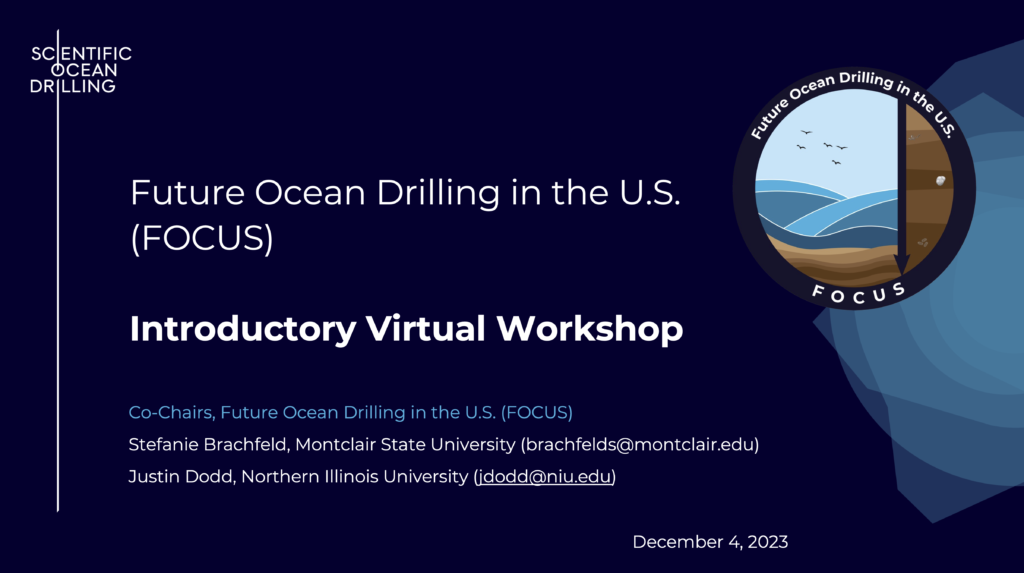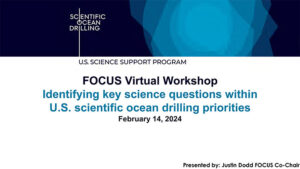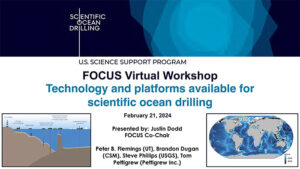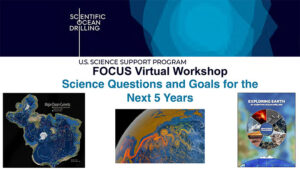Addressing Future Ocean Drilling in the United States (“FOCUS”)
Upon the conclusion of the International Ocean Discovery Program in 2024, the U.S. ocean science community will lack both a formal scientific ocean drilling program and consistent access to a U.S.-operated globally ranging riserless drilling vessel to implement the 2050 Science Framework. However, NSF-OCE has signaled its intent to continue supporting US scientific ocean drilling and has solicited expressions of interest to provide a coordinating office for US scientific ocean drilling activities. Thus, it is critical for the U.S. community to begin planning immediately for post-2024 subseafloor sampling activities.
A steering committee to address Future Ocean Drilling in the US (“FOCUS”) has been assembled to coordinate this planning effort. It consists of 17 members and as its main objectives will address the following questions:
-
- Within the 2050 Science Framework and the current fiscal constraints, what are the scientific priorities for the U.S. scientific ocean drilling community over the next 5-7 years that are achievable with the tools that are anticipated to be available?
-
- What subseafloor sampling options are available to address these priorities (e.g., U.S.-implemented MSP-type expeditions utilizing the JR, geotechnical vessels, or other platforms; seabed drilling technologies; ships with long coring capabilities, etc.)?
-
- How can the U.S. scientific ocean drilling community advance the argument for a future, state of the art, globally ranging U.S.-operated drilling vessel?
It is expected that this planning process will incorporate broad community input and include a series of virtual (i.e., online) workshops and an in-person workshop that address components of the charges listed above. The in-person workshop will occur in early spring of 2024 to assure timely input to OCE and will complement recommendations on approaches for future US ocean science research from the National Academies Decadal Ocean Survey Committee. In addition, the community will need to explore mechanisms to maintain the cohesion and strategic integrity of a U.S. scientific ocean drilling program, given the broad portfolio of research approaches that will likely be utilized (expeditions, international collaborations, LEAPs, and other research using legacy assets, etc.).
FOCUS Steering Committee
Stefanie Brachfeld (Montclair State University, Co-Chair)
Justin Dodd (Northern Illinois University, Co-Chair)
Chandranath Basak (University of Delaware)
Isla Castañeda (University of Massachusetts Amherst)
Beth Christensen (Rowan University)
Jeremy Deans (University of Southern Mississippi)
Peter Flemings (University of Texas Austin)
Jessica Labonté (Texas A&M, Galveston)
Chris Lowery (University of Texas Austin)
Cecilia McHugh (Queens College, City University of New York)
Steve Phillips (Woods Hole, U.S. Geological Survey)
Pratigya Polissar (University of California Santa Cruz)
Amelia Shevenell (University of South Florida)
Evan Solomon (University of Washington)
Jason Sylvan (Texas A&M University)
Sonia Tikoo (Stanford University)
Maureen Walczak (Oregon State University)
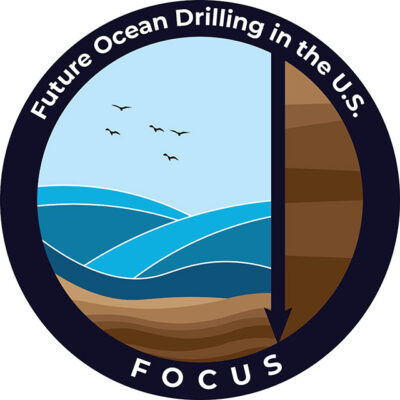
Virtual Workshops
The virtual workshops will provide community members with the opportunity to address high priority scientific and technology-related issues identified by the steering committee. Throughout the virtual workshop period, the steering committee will continue to aggregate community input to hone the agenda for the in-person workshop.
FOCUS Introductory Virtual Workshop
December 4, 2023
Virtual Workshop 2:
Identifying key science questions within U.S. scientific ocean drilling priorities
February 14, 2024
Virtual Workshop 3:
Technology and platforms available for scientific ocean drilling
February 21, 2024
Virtual Workshop 4:
Science questions and goals for the next 5 years
March 8, 2024
In Person Workshop
The in-person FOCUS workshop will be held in Denver, CO from May 21-23, 2024. Please apply here to attend. The deadline to apply is April 24.
Provide Input
Please use this form to provide input feedback, comments, and thoughts about FOCUS (Future of Ocean Drilling in the U.S.). This can include detailed feedback on your personal scientific priorities, as well as comments about the FOCUS activities in general.
Questions? Inquiries about the workshop can be sent to the steering committee co-chairs:
Stefanie Brachfeld, Montclair State University (brachfelds@montclair.edu)
Justin Dodd, Northern Illinois University (jdodd@niu.edu)


